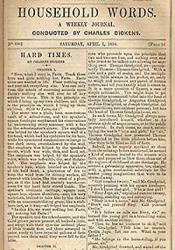Hard Times by Charles Dickens
In the novel, “Hard Times” by Charles Dickens, the industrial revolution is the main underlying theme as the characters experience losing their jobs due to the influx of machinery in factories. Dickens plays with the idea between the push for production, and the dismissal of emotions and imagination by showing major heads of industries push to strip their workers of enjoying a life outside of the workplace. This idea is seen through the characters, Gradgrind and Bounderby, as they educate others to focus on the facts of life instead of teaching creativity. This nineteenth-century novel brought the parallel between the “hands” of the factory and Gradgrind’s children, as they are both have uniform existences and are unaware of the beauties of life. These characters served as the utilitarian point of view as they are turning mechanical themselves showing the impacts of industrialization. “The reductionism inherent in Utilitarianism was exaggerated in the principles of political economy, the popular economic philosophy of the time that reduced all human relationships to economic self-interest” (Mambrol). Dickens’ novel is formative in the scope of “the novel” as it introduced a different perception of the industrial impact on civilian people from lower social classes. More readers could relate to the feeling of betrayal, corruption, and manipulation that allows for the novel to become inclusive for the reader.
Mambrol, Nasrullah. “Analysis of Charles Dickens's Hard Times.” Literary Theory and Criticism, 12 Feb. 2021, literariness.org/2021/02/12/analysis-of-charles-dickenss-hard-times/.

